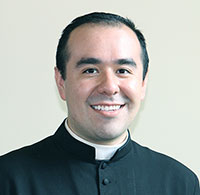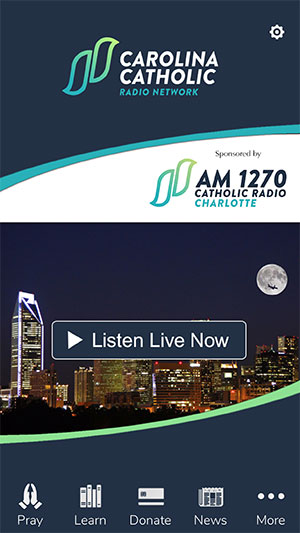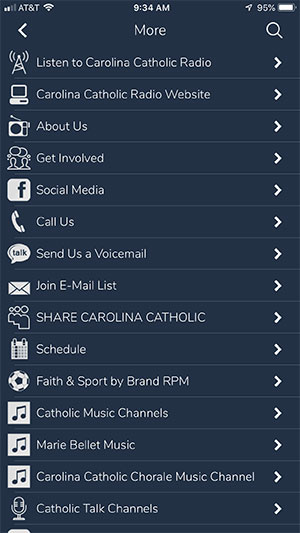CHARLOTTE — Seven mission churches in the Diocese of Charlotte will receive grant awards from the Diocese of Charlotte Foundation in 2019. The annual awards are given out based on need and the impact the funds are expected to have on their local communities.
This year $46,575 will be awarded. The grants range from $3,165 to $5,000.
One of the award recipients is Immaculate Conception Mission in Canton. Two programs at the mission will receive grant awards: minority teen scholarships and an evangelization initiative. Each program will receive a $5,000 award.
The money provided through the Diocese of Charlotte Foundation will enable the Canton mission to continue developing its youth ministry and outreach efforts – funding a bilingual youth evangelization director, Jessica Martin, and providing scholarships to needy students to attend pilgrimages and retreats such as Duc In Altum.
Martin, 21, has already made an impact with organizing popular youth events at the church on Wednesday nights that culminate with Eucharistic Adoration and Mass. Her personal outreach to youth in the community has already made a difference, noted Father Richard Sutter, parochial administrator.
“She is the bridge between middle school and high school, and she is the primary leader for coordinating the college age ministry,” he said. “She’s extremely gifted and talented in her organizational skills for her age, and she’s extremely thoughtful.”
One youth group participant agreed, saying, “She does so much. She keeps us all on track.”
Other missions in the diocese receiving grant awards include: Immaculate Heart of Mary Mission in Hayesville, $5,000 for the St. Vincent de Paul Society; Our Lady of Fatima Mission in Winston-Salem, $3,410 for roof repairs and $5,000 for interior painting of the church; Our Lady of the Mountains Mission in Highlands, $5,000 for interior painting of the church; St. Bernadette Mission in Linville, $3,165 for the Ave Maria Food Pantry; St. Frances of Rome Mission in Sparta, $5,000 for faith formation support; and St. Jude Mission in Sapphire, $5,000 for the Smoky Mountain Pregnancy Care Center and $5,000 for the Circle of Hope Program.
Since 2001, the Diocese of Charlotte Foundation has awarded 359 grants totaling $939,560.
“Each of those grants has allowed a parish, school or agency to more effectively serve people,” said Jim Kelley, diocesan director of development. “These dollars have had an impact.”
These grants are distributed from one of the foundation’s 260-plus endowments. For more information about these grants, contact Gina Rhodes at 704-370-3364 or This email address is being protected from spambots. You need JavaScript enabled to view it..
—SueAnn Howell, senior reporter
‘Love, Naturally!’
 CHARLOTTE — The Diocese of Charlotte will join the Church in dioceses across the U.S. in commemorating Natural Family Planning Awareness Week July 21-27.
CHARLOTTE — The Diocese of Charlotte will join the Church in dioceses across the U.S. in commemorating Natural Family Planning Awareness Week July 21-27.
“Love, Naturally! Natural Family Planning Cooperating with God’s Design for Married Love” is the theme of this year’s campaign. It is organized each year by the U.S. Conference of Catholic Bishops to celebrate married love and promote awareness of Natural Family Planning methods.
Growing in popularity as a healthy, safe and moral alternative to artificial contraception, Natural Family Planning methods represent a unique form of fertility education.
The Church supports NFP methods because they respect God’s design for marriage and the gift of life. In fact, NFP represents the only authentic approach to family planning available to husbands and wives because these methods can be used to both attempt or avoid pregnancy. These methods are based on observation of the naturally occurring signs and symptoms of the fertile and infertile phases of a woman’s menstrual cycle. No drugs, devices or surgical procedures are used to avoid pregnancy.
Practicing NFP reflects the dignity of the human person within the context of marriage and family life, promotes openness to life, and recognizes the value of the child.
By respecting the love-giving and life-giving natures of marriage, NFP can enrich the bond between husband and wife, providing them with the tools to help them live in harmony with God’s divine plan for human sexuality, marriage, conjugal love and responsible parenthood.
Batrice Adcock, MSN, serves as the diocese’s Natural Family Planning program director. She notes many advances in technology are helping women track their fertility.
“Apple recently announced that it will be adding new menstrual tracking software to the health app with the upcoming iOS 13 and Watch OS 6 update,” Adcock says. “Similar to other cycle trackers, users will be able to record periods and track symptoms, such as spotting and cramps. FitBit and Garmin watches also introduced cycle tracking features within the last year.”
The Food and Drug Administration also approved a mobile fertility app, Natural Cycles, in 2017, as a medical device to prevent pregnancy. Natural Cycles uses its own basal body thermometer and algorithm to calculate when a woman is fertile or infertile.
“The rapid advancement of ‘fem-tech’ is proof that women are beginning to take their menstrual cycles seriously,” Adcock says.
She also points out that the American College of Obstetrician and Gynecologists and the American Academy of Pediatrics encourage teens and women to consider their menstrual cycles as a vital sign.
Research into women’s health is drastically improving, and many women are on the pill to treat non-reproductive health problems, she adds. But, as women learn how important ovulation is for their health and that their menstrual cycles are a reflection of their health, they are increasingly seeking alternative options to treat their underlying health problems.
‘Rather than ‘treating’ symptoms, such as acne or migraines by suppressing ovulation with the pill, women are looking to restore normal hormone balance and health,” Adcock says. “Even though this approach requires more education and discipline, women are willing to protect their future fertility.”
Adcock adds that it is critical teens get educated on the importance of their cycles for their overall health.
“Ovulation impacts bone growth and brain development, the cardiovascular system, and overall well-being. The answer to menstrual problems is not suppressing ovulation with the pill and its inherent risks of decreased bone density, depression and stroke,” she says.
“A healthy teen is encouraged to track her cycles as well-she has a monthly tool for assessing the impact her lifestyle choices have on her health. She grows immensely in self-awareness-coming to understand, with time, how her hormones impact her energy, emotions and behavior,” Adcock adds.
One way the diocese is educating teens focuses on a method of Natural Family Planning called FEMM, which comes with a free app. Several instructors around the diocese, English and Spanish speaking, offer instruction in FEMM and other NFP methods.
In the Charlotte diocese, two teenFEMM retreats have been offered with success in Charlotte and Boone. Other retreats are being organized this fall.
“Mothers and their daughters (pre-teen and teen) are learning the ins and outs of the menstrual cycle, in the context of Church teaching on feminine dignity,” Adcock explains.
— SueAnn Howell, senior reporter. USCCB contributed.
Learn more
At Catholic Charities’ website, www.ccdoc.org/nfp, get information in English and Spanish about NFP under the Services/Family Enrichment tab. Included are a schedule of free, one-day NFP courses around the diocese; video testimonies from couples, a physician and a diocesan priest about the many benefits of NFP; a list of NFP supportive physicians in North Carolina; plus detailed information about the various NFP methods and other basics.
For questions, contact Batrice Adcock, MSN, Natural Family Planning program director, at 704-370-3230 or This email address is being protected from spambots. You need JavaScript enabled to view it..
The Catholic News Herald recently spoke to Father Alfonso Gámez who was ordained a priest for the Diocese of Charlotte June 22 and has been assigned to St. Mark Parish in Huntersville.
 CNH: Alfonso, tell us when and where you were born, the names of your parents and how many brothers you have.
CNH: Alfonso, tell us when and where you were born, the names of your parents and how many brothers you have.
Gámez: I was born in the city of Clyde, in Haywood County, in 1990. My parents are José Alfonso Gámez and Ana María Gámez. I have one older sister, who is married and has two children. In 1992, my family moved to Hendersonville and there I grew up. In 2010 I came to Charlotte to start my college years. My parents are from Indaparapeo, Michoacán, Mexico. My father, from a very young age, used to work for seasons in the United States and then return to Mexico. When my parents got married in 1988 they had the idea to come to the United States to work and raise some money. They always thought, like many people, to stay for about three years and go back and to live in their hometown. God had other plans!
CNH: What beautiful memories do you have of your childhood?
Gámez: They have to be the times when we were traveling to Mexico. My family used to travel for the Christmas holidays to our town. I really liked listening my parents talk about their lives, traditions, customs. Those trips gave me a lot of perspective of the world on both sides of the border.
CNH: When did you hear the call to the priesthood?
Gámez: When I realized that I had more desire to study religious and moral issues than my academic studies. When I started my studies at the University of North Carolina at Charlotte (UNCC), I was studying civil engineering. But I spent more time in church and in catechetical groups than in the engineering lab. There I realized that my deepest longings were for an extraordinary life through this vocation, and not a professional life, even if it were to be a successful one.
CNH: Were you involved in the Church earlier in your life?
Gámez: I was never an altar boy, nor was I involved in youth groups. But when I was in high school my interest in the Church was something intellectual. I wanted to know what my beliefs were and why I believed what I professed. Unconsciously, I was hungry for the truth. From there the desire was born in me to share the truth I had found, and then I started to teach catechism classes. I served as a catechist in the parishes of Immaculate Conception in Hendersonville and in St. John Neumann in Charlotte. When I was at UNCC, I was also very involved in the university’s Catholic Campus Ministry group. I served as president of the organization in 2011.
CNH: Did you have girlfriends? What did they tell you when you told them that you were planning to become a priest? What did your parents say?
Gámez: I never had a girlfriend, but I had always planned to get married. In fact, when I joined the Catholic group at the university, I have to confess that this was one of my reasons for joining – to meet my future wife. And in a sense I did, because it was in those years that I found my vocation and my love for the Church.
My parents have always supported me. My mother, on her side, had considered a vocation to religious life, so for her those questions were not strange. At the beginning, my father did not understand the process or my situation with my career, but he always told me that he trusted my decisions.
CNH: When did you enter the seminary? How were your studies?
Gámez: I was accepted as a seminarian of the diocese in May 2013. That same year, in August, Bishop (Peter) Jugis sent me to study at the Pontifical College Josephinum in Columbus, Ohio. There I completed six years of studies: two years of philosophy and four years of theology.
As I mentioned earlier, my vocation journey began with the intellectual hunger I had for the faith. Then, when I started my studies, I felt like a sponge – absorbing everything that was presented to me. I liked my studies very much and it will be a life that I will miss.
CNH: Any doubts along the way? What strengthened your decision?
Gámez: Always. I had many doubts at several stages of my formation. But the Lord gave me two very great gifts: a good memory and incredible seminary friends. I had to make a habit of memory and remember the reasons why I had entered the seminary, my love and desire at the beginning and to think that if I left the seminary I would only live an incomplete life. The friends that the Lord gave me always reminded me of who I am and motivated me in difficult times. I am inspired by the families I have met here in the diocese. As a priest I will have the ability to bring them to God Himself. That motivates me.
CNH: Do you think you will be a priest who is outgoing or rather a bit conservative?
Gámez: I really do not know, as I've never been a priest and I do not know how I'm going to be. Maybe you can compare it to when you ask a man before his first child is born if he is going to be a “strict” or “relaxed” father. It is hard to say. Either way, I intend to serve the needs of my parishioners, whether they are outside or inside the parish.
CNH: Regarding your new life, what do you think will be the most beautiful aspect and what do you think could be difficult?
Gámez: I think the most beautiful thing will be to witness the wonders that the Lord is going to do in the lives of the people I serve. That moves me a lot, to see the transformations and conversions He makes happen. I think the most difficult thing is going to be when you do everything you can, but despite that some people decide to turn away from God and the Church.
CNH: How do you see yourself in 30 years?
Gámez: In 30 years, I cannot imagine what the Lord has planned for me. Ten years ago I would never have imagined that these days I would be on the eve of my ordination. It was never part of my plans to take this path, but I could not be happier.
— César Hurtado, Hispanic reporter
 CHARLOTTE — The Carolina Catholic Radio Network is even easier to hear anywhere you are with its new app.
CHARLOTTE — The Carolina Catholic Radio Network is even easier to hear anywhere you are with its new app.
This app is not just a streaming radio app, it’s an app for all things Catholic, says founder and spokesperson for the Carolina Catholic Radio Network, David Papandrea.
“It has everything on it,” Papandrea notes. “When looking to launch an app, we looked at how people are using their devices, from a Catholic perspective, to see what we should include.”
The CCRN app is sponsored by Catholic Radio Charlotte, WCGC AM1270. The station started broadcasting Jan. 31, and it reaches an estimated 500,000 people over the airway from Hickory to Rock Hill, S.C., including Huntersville and Charlotte.
The app, which has been live since early May, is meant to be an “in-your-pocket” resource for all things Catholic. It includes prayer and Mass resources, the Bible, links to grow in your faith, local Catholic links and music, EWTN archives and even a prayer intention wall.
“Everything you could possibly want is there, and if someone has a request, we’re committed to review and potentially ask for it,” Papandrea says.
The CCRN has already added a “Mass times near you” function since it launched. Papandrea said they also want to develop a section focused on young adults and their spiritual journey.
With a month of analytics for the new app, Papandrea says users are spending the most time with the “pray” section.
CCRN has looked to expand its over-the-air stations in the network to cover the entire Charlotte diocese.
“The app is a way to overcome the biggest objection we’ve heard as we’ve looked to expand: ‘we can’t hear you!’” Papandrea says.
“The number of people with smart phones is as close as you’re going to get to reaching most people, and it does it for a fraction of the cost. As long as the technology is there, we certainly have to embrace it. Every conceivable group can be touched with this app.”
The app is available for download for free in the Apple and Android marketplaces.
— Kimberly Bender, online reporter

Learn more
At www.carolinacatholicradio.org: Download the app, stream the station, donate or learn about bringing a station to your area

